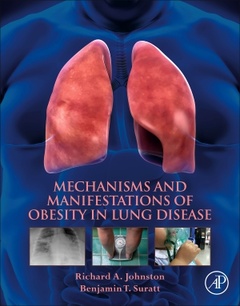Description
Mechanisms and Manifestations of Obesity in Lung Disease
Authors: Johnston Richard A., Suratt Benjamin T.
Language: English
Subject for Mechanisms and Manifestations of Obesity in Lung Disease:
Keywords
Adaptive immunity; Adipocytes; Adipose tissue; Adipose tissue dysfunction; Adiposity; Airway dysanapsis; Airway hyperresponsiveness; Airway mechanics; Angiogenesis; Animal model; Antibody; Antigen; Antiviral; Apolipoprotein A-I; Apolipoprotein E; ARDS; Asthma; Bioenergetics; Body mass index; Breast milk; Cardiometabolic health; Cholesterol; Chronic bronchitis; Chronic obstructive pulmonary disease; Clusterin (apolipoprotein J); COPD; Critical illness; Diabetes; Diet; Diffusing capacity; Emphysema; Eosinophil; Extracellular matrix; Gut microbiome; Immune cells; Immunity; Inflammation; Influenza; Innate immunity; Innate lymphoid cells; Interleukin; Leptin; Lipid metabolism; Lipids; Lung; Lung function; Lung injury; Lung volumes; Maternal obesity; Metabolic syndrome; Metabolism; Methacholine; Microbiome; Mitochondrial dysfunction; Mouse; Neonatal; Obesity; Oscillometry; Ovalbumin; Ozone; Pulmonary arterial hypertension; Pulmonary disease; Pulmonary vascular disease; Pulmonary venous hypertension; Reactive oxygen species; Sleep apnea; Spirometry; T cell; Treatment; Tumor necrosis factor; Vaccination; Ventilation heterogeneity; Visceral
353 p. · 19x23.4 cm · Paperback
Out of Print
Description
/li>Contents
/li>Readership
/li>Biography
/li>Comment
/li>
Mechanisms and Manifestations of Obesity in Lung Disease is a complete resource on the epidemiology and molecular mechanisms related to obesity and lung disease. Obesity has not simply changed the epidemiology of pulmonary disease, it has had a profound impact on the pathophysiology of common pulmonary diseases. As the obesity epidemic has taken hold throughout the developed world, scientists and clinicians are now challenged with identifying the mechanisms by which obesity alters lung health and the pathogenesis of lung diseases. This book is an important new resource for both clinicians and scientists dealing with these new health problems in pulmonary medicine.
1. Adipose Tissue Metabolism and Inflammation in Obesity 2. Complex Interface Between Immunity and Metabolism: The Lung as a Target Organ 3. Obesity and Lung Function: From Childhood to Adulthood 4. Obesity and Obstructive Lung Disease: An Epidemiologic Review 5. Mechanistic Insights from Human Studies of Asthma 6. Obesity and Asthma: What Have We Learned from Animal Models? 7. Obesity, Mitochondrial Dysfunction, and Obstructive Lung Disease 8. Metabolic Syndrome and Sleep Apnea: A Bidirectional Relationship 9. Obesity and Pulmonary Hypertension 10. Influence of Obesity on the Response to Influenza Infection and Vaccination 11. Obesity and the Acute Respiratory Distress Syndrome 12. Obesity and the Microbiome: Big Changes on a Small Scale? 13. Apolipoproteins as Context-Dependent Regulators of Lung Inflammation
adult and pediatric pulmonologists, adult and pediatric intensivists, Ph.D. scientists, pulmonary and critical care subspecialty fellows, postdoctoral fellows, and graduate students.
Dr. Suratt is a Professor of Medicine and Cell & Molecular Biology; Vice Chair of Medicine for Academic Affairs; and the Associate Chief of Pulmonary Disease and Critical Care Medicine in the Department of Medicine at the University of Vermont College of Medicine. He is an active member of over 10 professional organizations including the American Thoracic Society, the Society of Critical Care Medicine, and the American College of Chest Physicians. Dr. Suratt's research career has focused on the role of innate immunity in the pathogenesis of critical illness, particularly ARDS. His
- Presents an all-in-one resource that describes the impact of obesity on the development and severity of lung disease
- Details the molecular and immunologic mechanisms by which obesity impacts the pathogenesis and outcomes of lung disease
- Includes contributions from authors who are internationally recognized as leaders in the area of obesity and lung disease

